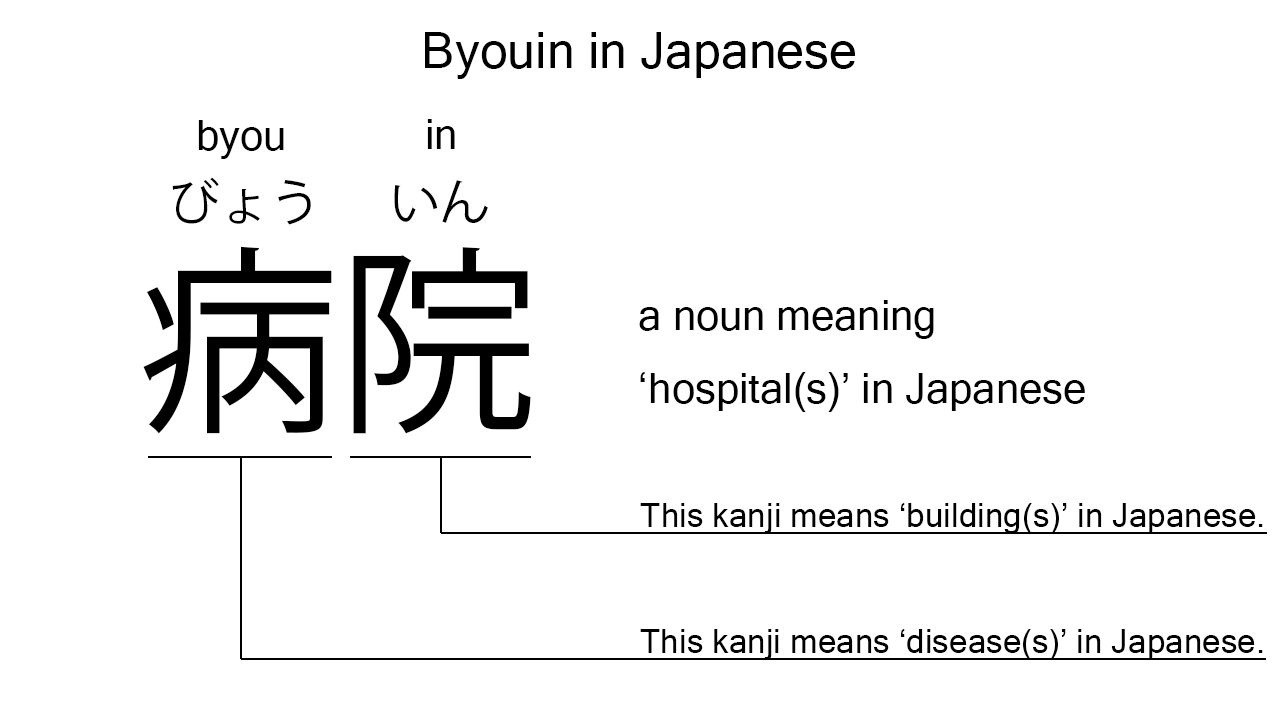What does “byouin” mean in Japanese?
Native speakers say “byouin” to mean ‘hospital’ in Japanese. Perhaps, some Japanese learners know this word as it is sometimes used in Japanese conversations. In this blog post, however, I will explain this word in detail based on its kanji expression. And also, I will explain how to use it through example sentences. My explanations would help Japanese learners understand “byouin” more clearly. Then, let’s get started!
Contents
Definition and meaning of “byouin”
Let me start with the definition and meaning of “byouin”.
- byouin – 病院 (びょういん) : a noun meaning ‘hospital’ in Japanese. This can also work as plural. Learn more about Japanese plural.
Japanese native speakers use this noun to refer to a place, normally a large building, where people receive medial care.
The definition and meaning are simple and clear, I think. To understand this noun more clearly, however, let me explain its kanji characters in detail, one by one.
What does “byouin” literally mean in Japanese?
The kanji expression of “byouin” consists of the following two kanji characters:
- 病 : a kanji character widely used to mean ‘disease’, ‘sickness’, or ‘illness’ in Japanese. This can also be found in other words like “byouki“.
- 院 : a kanji character often used as a suffix to add the meaning of ‘institution’, ‘building’, or ‘office’ in Japanese.
These two kanji characters tell us that “byouin” literally means a ‘building for diseases’ in Japanese. This literal interpretation is not completely in line with the actual meaning, but still understandable, I think. Hospitals are often buildings for the diseased.

When we meet new kanji expressions, we should check their kanji characters in detail to understand their meanings clearly and deeply. In many cases, kanji characters tell us a lot about the meanings of the expressions they form. Actually, here, we could get the better understanding of “byouin” through the detailed kanji check above.
So far, I’ve explained the definition and meaning of “byouin” together with its kanji characters. Then, let me explain how to use it through the example sentences below.
Example #1: how to say “hospital” in Japanese
boku wa kinou byouin ni it ta – 僕は昨日病院に行った (ぼくはきのうびょういんにいった)
I went to a hospital yesterday.
Below are the new words used in the example sentence.
- boku – 僕 (ぼく) : a pronoun meaning ‘I’ in Japanese. This is used mainly by boys and young males.
- wa – は : a binding particle working as a case marker or topic marker. In the example, this works after “boku” to make the subject in the sentence.
- kinou – 昨日 (きのう) : a noun meaning ‘yesterday’ in Japanese. This can also work as an adverb almost anywhere in a sentence. In the example, this works as an adverb in the middle of the sentence to say “yesterday” in Japanese.
- ni – に : a case particle used to say where someone or something goes. In the example, this is used after “byouin” to say where the speaker went yesterday.
- it – 行っ (いっ) : one conjugation of the verb, “iku“, which means ‘to go’ in Japanese. In the example, it has been conjugated for the better connection with its following word.
- ta – た : an auxiliary verb used after a verb, adjective, or auxiliary verb to make its past tense form. Probably, this is well known as a part of Japanese ta form. In the example, this is used after “it” to make its past tense form, “it ta”.
This is a typical usage of “byouin”. In this example, it works together with the case particle, “ni”, to become the object in the sentence.
Example #2: another usage of “byouin”
kanojo wa byouin de hatarai te iru – 彼女は病院で働いている (かのじょはびょういんではたらいている)
She is working at the hospital.
Below are the new words used in the example sentence.
- kanojo – 彼女 (かのじょ) : a pronoun meaning ‘she’ in Japanese.
- de – で : a case particle used to say where someone does something. In the example, this is used after “byouin” to say where she is working.
- hatarai – 働い (はたらい) : one conjugation of the verb, “hataraku“, which means ‘to work’ in Japanese. In the example, it has been conjugated for the better connection with its following word.
- te – て : a conjunctive particle used after a verb, adjective, or auxiliary verb to make its te form. In the example, this is used after “hatarai” to make its te form, “hatarai te”. Verbs need to be changed to their te forms to be connected with “iru”.
- iru – いる : an auxiliary verb used to express the continuity of the action described by its preceding verb. In the example, this is used after the te-formed verb, “hatarai te”, to express the continuity of its action, ‘to work’.
This is another typical usage of “byouin”. In this example, it works together with the case particle, “de”, to say where she is working. When we want to say “hospital” in Japanese, anyway, this noun is always a very good option.
Summary
In this blog post, I’ve explained the definition and meaning of “byouin” in detail based on its kanji expression. And also, I’ve explained how to use it through the example sentences. Let me summarize them as follows.
- byouin – 病院 (びょういん) : a noun meaning ‘hospital’ in Japanese. This can also work as plural. These two kanji characters literally mean a ‘building for diseases’ in Japanese. This literal interpretation is not completely in line with the actual meaning, but still understandable, I think. Hospitals are often buildings for the diseased.
Hope my explanations are understandable and helpful for Japanese learners.